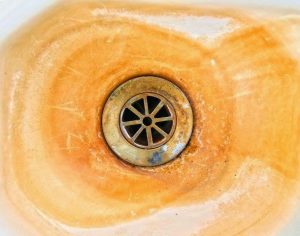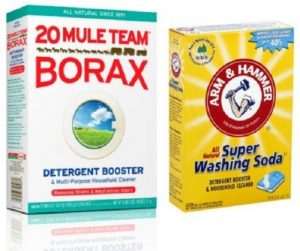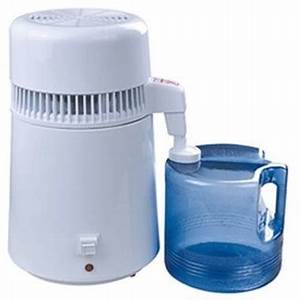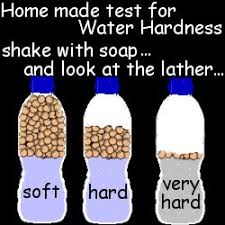 What is Hard Water?
What is Hard Water?
Water Hardness scale by Danial David, image source courtesy: alchetron.com
Hard water is water that contains minerals. How do the minerals get into the water? As water flows through the ground it partially dissolves minerals through which it flows. Dissolved mineral particles, such as calcium and magnesium, then flow along, suspended in the water. Although calcium and magnesium are the most common minerals found in hard water, some water also contains ferrous iron, manganese, and hydrogen sulfide gas. Water treatment experts measure the hardness of water based on how many grains of contaminant are found per gallon of water.
Is Hard Water Really a Problem?
The short answer?
YES!

This clumping of soap and detergent makes rinsing difficult. 
Ferrous iron creates the nasty-looking rust stains in your sinks and manganese, often found with ferrous iron, leaves even nastier-looking black stains. Sometimes hard water also contains hydrogen sulfide gas. You’ll know your water has this problem if it has that characteristic “rotten egg” smell.
So, What Can You Do if You Have Hard Water?
You can deal with your hard water issue in a few different ways.
Filters: Some people choose to use home water distillation or reverse osmosis appliances. Others install water filters either under the sink or on the faucet. While distillation and water filters can improve the taste of drinking water, they are far too expensive to be practical solutions household-wide.

Descaling: Speaking of scale, descaling is another option many people choose for dealing with the damaging effects of hard water on pipes and fixtures. Descaling addresses the results of hard water on pipes, shower heads, and faucets. It uses industrial strength chemicals to “eat away” at the calcium, lime, and rust deposits. One problem with descaling is that once you add it into your main water line, you have to be sure to flush the whole system thoroughly before drinking water or bathing. The other problem is that the chemicals can also potentially cause corrosion to your pipes themselves. If you want to descale your pipes, your best bet is to call a professional.
Water Softeners: By far the most popular method of dealing with hard water is a water softener. They use a process of removing damaging minerals from the water without adding any corrosive chemicals. Water softeners come in a variety of sizes and styles to fit any situation. Easy to use, water softeners provide demineralization on a large scale and are unquestionably the most cost-effective means of dealing with hard water.
How to Know if You Have Hard Water
This DIY test may give you semi-accurate results, but if you want to know for sure how many and which kind of minerals are in your water, you need to get it tested. Hardware stores and many online stores sell test kits you can use to test your water. Of course, your plumber can provide the most accurate testing — for free. If you do have hard water, you definitely want to talk to your plumber about options for dealing with the situation.
POSTS YOU MAY ALSO LIKE:
Hard Water: How to Test in Aquariums
The post Water Softeners: Part 1 Hard Water appeared first on KNOXVILLE WATER TREAMENT | Water filters & Softeners | Water Purification Systems.
source http://knoxvillewatertreatment.com/water-softeners/




No comments:
Post a Comment